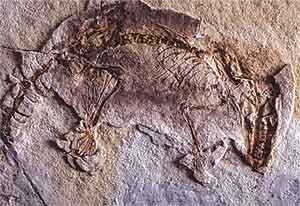

The earliest placental mammal - Eomaia ("Early Mother")


The earliest placental mammal - Eomaia ("Early Mother")
"April 24, 2002 -- Scientists today announced the discovery of a spectacular fossil: a mammal that lived alongside dinosaurs 125 million years ago. This new species, reminiscent of a chipmunk, is the earliest known ancestor of placental mammals, a group that includes humans. Its remarkably well-preserved remains provide clues about the evolution of man's kin." [National Public Radio, 24 April 2002]
Eomaia was found [in 2000] at a site northeast of Beijing in China. In an article in Nature,
Dr. Zhe-Xi Luo, a curator at the Carnegie Museum of Natural History, describes
the 5" skeleton, which is essentially complete and contains endocasts of
internal tissue and hair. Eomaia is the earliest known representative
of the mammalian subclass Eutheria (placental mammals). The find
is especially notable because the oldest previous eutherians date to 115
MYBP, and consist of only a few teeth. According to the NPR report, "Eomaia
was adapted to scramble through bushes and trees - presumably to find food,
but also to get away from predators, which could well have included small
dinosaurs." The reconstruction at right is posed in a dawn redwood, a relative
of modern Sequoias and Redwoods.
Photo & Drawing © 2002 by National Public Radio; arrangement of material
©
2005 by Steven M. Carr